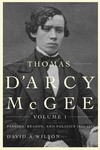
Thomas D’arcy Mcgee: Volume 1
David A. Wilson
McGill-Queen's University Press
$39.95
cloth
448pp
978-0-7735-3357-8
Volume 1 of Wilson’s even-handed biography, covering the first 32 years of McGee’s short life, takes an objective view of this charismatic and conflicted man. Part of this book’s appeal is discovering how McGee went from being an Irish Nationalist, speaker for the temperance movement, and Anglophobe to his core, to becoming a liberal with a drinking problem who determined that British North America was the place to raise his young family.
McGee lost his mother very early and left his native Ireland at 17 partly due to his inability to get along with his stepmother. In Rhode Island he found a substitute mother in his Aunt Bella; he also found outlets for his considerable talents as speaker and writer. Born with the gift of the gab, he learned his oratory from some of the best of that era: Daniel Webster, Daniel O’Connell, and Robert Peel. Contemporary accounts of his speeches sometimes begin with comments on his “uncouth” appearance and his dishevelled clothing, and “the contrast between his ‘flat and heavy’ features and his soaring oratory.” The phrase “coffin ships” came from one of his speeches in Ireland. His career as journalist and writer kept him in funds, but his raison d’être was his advocacy of his fellow Irish immigrants. While the current myth of “No Irish Need Apply” was not entirely true in the New World, the largely Protestant United States was wary of Catholic immigration threatening its way of life
Eventually McGee returned to Ireland and took part in the abortive uprising of 1848; he then fled to the United States to avoid being tried for treason. Ironically enough, at this period of his life he espoused principles that would later be claimed by the Fenians.
Back in the United States he underwent a conversion experience and, although always faithful to his Catholicism, now became ultraconservative, battling for a Celtic way of life against what he perceived as Anglo-Saxon rule. In this phase of his political development he railed against republicanism and alienated many who had formerly lionized him.
In his speeches and writings (one article was entitled “Popular Fallacies about Irish History”) McGee tried to dispel common myths that held back his fellow immigrants, but he was not above concocting a few myths of his own. All his life some considered him to be untrustworthy, claiming that he was always impelled by personal ambition. Wilson disagrees with this, arguing that for McGee, “anger, passion, and idealism pushed him to extremes, while reflection, reason, and pragmatism pulled him towards the centre; the centrifugal was constantly at war with the centripetal.” This duality compelled him to act in ways that were sometimes at odds with self-interest: he made enemies whose attacks eventually killed him.
McGee’s ideas, and some of the psychology which might have provoked them, are described in great detail, as are the historical settings that led him to such inner turmoil. By destroying the myth of the “heroic” Thomas D’Arcy McGee, Wilson instead gives us valuable insights into a much more interesting real man, one whose head and heart were frequently at odds. mRb






0 Comments